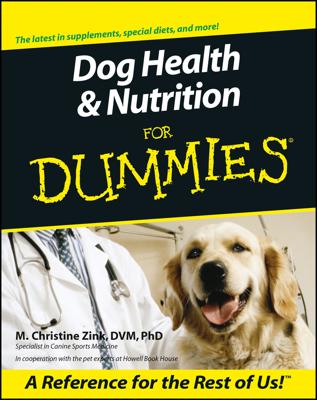Dogs are omnivores, like humans. They like and can exist on meat or plant material — although they prefer meat. Dogs love treats of carrots, celery, or apple, but meat is a lot closer to their hearts.
A lot of different nutritional elements (about 60) go into keeping your pet healthy, including:
Protein: All animals require life-giving protein, found in animal products and legumes. Protein should comprise from 25 to 42 percent of a growing or working dog’s diet; older dogs need from 14 to 21 percent. Meat, poultry, dairy products, and eggs are highly digestible and, therefore, are high-quality sources of protein.
Carbohydrates: Sugars and starches are a source of energy. Of all the ingredients in prepared dog foods, carbohydrates are probably not what a dog would choose to eat in the wild, but they can use the carbohydrates found in commercial foods, which tend to be the largest component of most commercial dog foods. Carbohydrates appear on pet-food labels as corn, soybeans, sorghum, beet pulp, barley, and rice.
Fats: Fat is essential for the absorption and movement around the body of certain vitamins — the fat soluble vitamins. Fat also provides food with much of its appeal to the canine nose and palate, and with essential fatty acids which play an important role in coat quality.
Fat percentages in dry dog food run from 5 percent to more than 30 percent. Diet foods have less fat, and foods for working, growing, or pregnant dogs have more fat.
Vitamins and minerals: Vitamins are divided into two categories — water-soluble and fat-soluble. Both are important to your dog’s health, and the lack of any vitamin in your pet’s diet can have dire effects. Water-soluble vitamins include the B vitamins, niacin, panthothenic acid, folic acid, biotin, choline, and vitamin C. Fat-soluble vitamins are vitamins A, D, E, and K
Mineral nutrients your dog needs include potassium, magnesium, zinc, calcium, iron, phosphorus, sodium, chloride, and others. Like vitamins, they make up a small part of your pet’s diet, but they’re essential for good health.
Your dog needs the correct amount of vitamins and minerals, but not more. An oversupply of vitamins and minerals can prove dangerous, so don’t give your pet supplements until you discuss them with your veterinarian first. Although excess amounts of water-soluble vitamins are passed in the urine, fat-soluble vitamins can — and do — build up to toxic levels.
Don’t forget that your pooch needs clean, fresh, and ever-present water — essential to nearly every bodily process.

